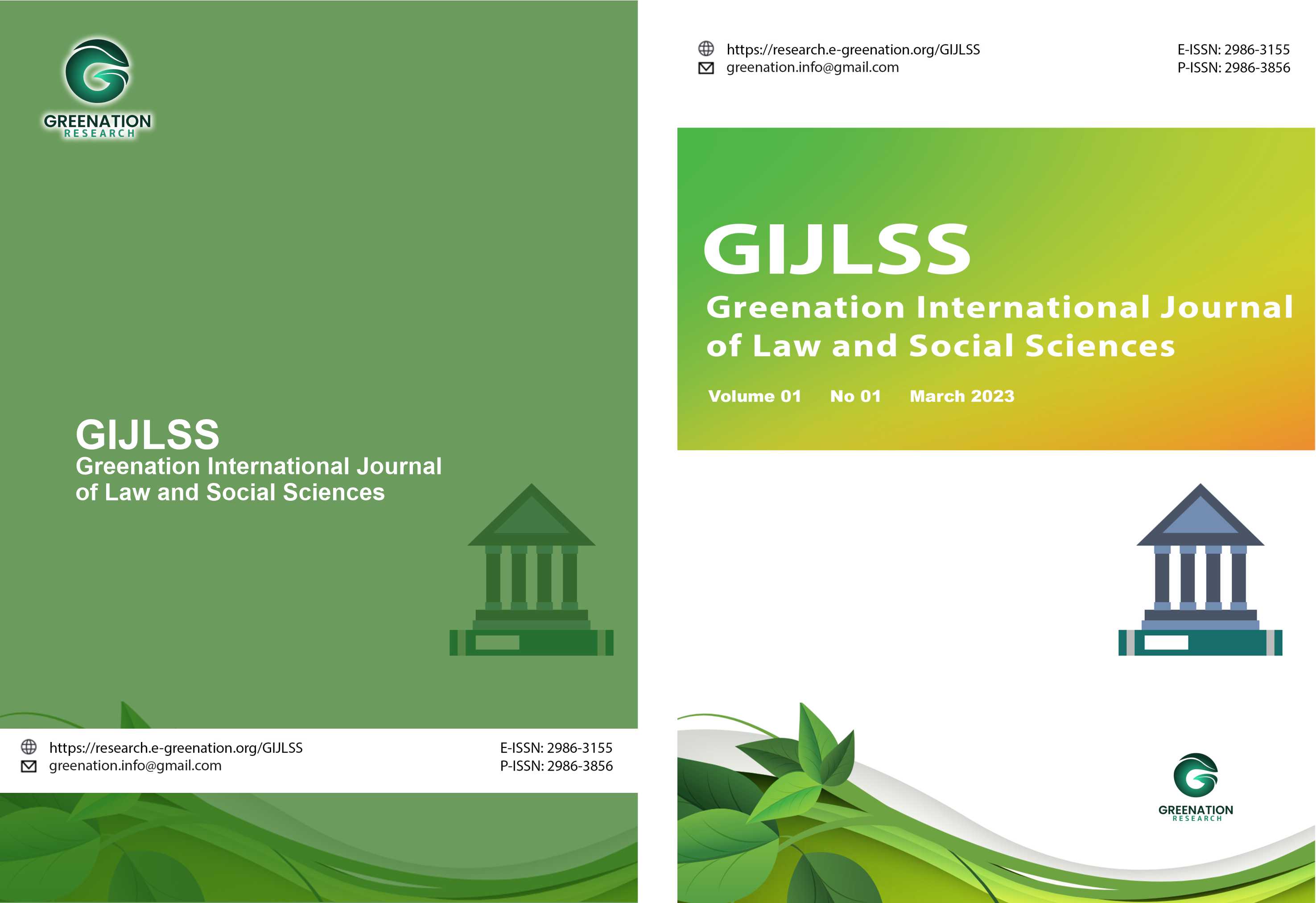Balance Between Transparency and Data Protection in Digital Government as Public Information Disclosure Implementation in Indonesia
DOI:
https://doi.org/10.38035/gijlss.v3i2.495Keywords:
Public information disclosure, Digital government, Legal responsibility, TransparencyAbstract
Public information disclosure is one of the main pillars in realizing transparent and accountable governance. In the digital era, information disclosure is increasingly relevant with the development of the concept of digital government that relies on information technology in the provision of public services. Digital government in Indonesia is regulated through various regulations, including Law No. 14 of 2008 concerning Public Information Disclosure (UU KIP) and policies related to the Electronic-Based Government System (SPBE). The regulation emphasizes that every public body is required to provide access to information to the public, except for information that is excluded based on legal provisions. However, the implementation of information disclosure in digital government still faces various challenges, such as limited technological infrastructure, lack of awareness of public officials, and protection of personal data that must be balanced with the principle of transparency. This study aims to analyze public information disclosure in the digital government in Indonesia and the legal responsibilities inherent in its implementation. The approach used is the normative legal research method with statutory regulatory analysis techniques and a conceptual approach. The data used in this study comes from various related regulations, academic literature, and relevant policy documents. The analysis was conducted by examining the government's obligations in providing public information digitally, legal sanctions for non-compliance, and challenges in its implementation. The results of this study are expected to contribute to the development of more effective policies to improve transparency, accountability, and legal certainty in digital government in Indonesia.
References
Almahdali, H., Qomariyah, E., Paselle, E., Fadri, Z., Pradana, I. Y., Rustan, F. R., . . . Suyatno. (2024). Reformasi Birokrasi Dalam Administrasi Publik Tantangan Dan Peluang Di Era Digital. Sumatera Barat: Yayasan Tri Edukasi Ilmiah.
Andhika, L. R. (2017). Evolusi konsep tata kelola pemerintah: Sound governance, dynamic governance dan open government. Jurnal Ekonomi dan Kebijakan Publik, 8(2), 87-102. Doi: https://doi.org/10.22212/jekp.v8i2.867
Aprilla, W. W. (2024). Meningkatkan Transparansi dan Akuntabilitas Pemerintah Melalui Teknologi Digital dan Partisipasi Publik dalam Upaya Pemberantasan Korupsi. Eksekusi: Jurnal Ilmu Hukum dan Administrasi Negara, 2(4), 321-334.
Awaludin, L. (2019). Strategi penguatan kompetensi SDM Teknologi Informasi&Komunikasi (TIK) dalam mengoptimalkan penerapan Sistem Pemerintahan Berbasis Elektronik (SPBE). Paradigma POLISTAAT: Jurnal Ilmu Sosial Dan Ilmu Politik, 2(2), 118-134.
Chairunnisa, L. H. (2023). Implementasi Kebijakan Keterbukaan Informasi Publik. Jurnal Ilmu Administrasi Negara ASIAN (Asosiasi Ilmuwan Administrasi Negara), 11(2), 31-45.
Fauzy, E. &. (2022). Hak Atas Privasi dan Politik Hukum Undang-Undang Nomor 27 Tahun 2022 Tentang Pelindungan Data Pribadi. Lex Renaissance, 7(3), 445-461.
Giffari, M. F., Wiyati, E. K., Andriani, F., & Putri, C. E. (2024). Peran Humas Dalam Keterbukaan Informasi Publik Pada PPID Kemendikbudristek. Jurnal Cyber PR, 4(2), 119-131.
Katharina, R., & Jaweng, R. N. (2021). Pelayanan publik & pemerintahan digital Indonesia. Jakarta: Yayasan Pustaka Obor Indonesia.
Kurnia, T. S. (2017). E-Government Dalam Penyelenggaraan Pemerintahan Daerah Di Indonesia. Masalah-Masalah Hukum, 46(2), 170-181.
Maryuni, S., Pardi, Darmawan, D., Apriyani, E., Rudianto, Zesa, P., & Selpiani, W. (2024). Transformasi pelayanan digital terpadu dalam penerapan sistem pemerintahan berbasis elektronik. Jurnal Pembelajaran Pemberdayaan Masyarakat (JP2M), 5(4), 1011–1028. Doi: https://doi.org/10.33474/jp2m.v5i4.22479
Rachmad, Y. E. (2024). Layanan Dan Tata Kelola E-Government: Teori, Konsep Dan Penerapan. Yogyakarta: PT. Green Pustaka Indonesia.
Rahman, F. (2021). Kerangka Hukum Perlindungan Data Pribadi Dalam Penerapan Sistem Pemerintahan Berbasis Elektronik Di Indonesia. Jurnal Legislasi Indonesia, 18(1), 81-102.
Retnowati, E. (2012). Keterbukaan informasi publik dan good governance (antara das sein dan das sollen). Perspektif, 17(1), 54-61. Doi: https://doi.org/10.30742/perspektif.v17i1.94
Rizky, A. M., Pratiwi, M. P., Chairunnisa, A., Aiko, I. A., & Ariesmansyah, A. (2025). E-Goverment: Meningkatkan Efisiensi dan Efektivitas Pelayanan Publik di Indonesia. Innovative: Journal Of Social Science Research, 5(1), 2070-2089.
Soetarto, H., & Yuliastina, R. (2022). Implementasi Peraturan Presiden Nomor 95 Tahun 2018 Tentang Sistem Pemerintahan Berbasis Elektronik (SPBE). PUBLIC CORNER, 17(2), 32-44.
Tanaamah, A. R. (2021). Tata Kelola Teknologi Informasi Pada Sektor Publik: Penyelarasan Teknologi Informasi Dengan Visi Kepemimpinan. Jurnal Teknologi Informasi dan Ilmu Komputer (JTIIK), 8(6), 1-12.
Ulumiyah, P. R. (2024). Meningkatkan Keterbukaan Publik: Strategi Humas Pemerintahan dalam Pelayanan Informasi Publik pada Portal Website PPID Kementerian Pemberdayaan Aparatur Negara dan Reformasi Birokrasi. Jurnal Pembangunan Dan Administrasi Publik, 41-58.
Wibowo, C. D. (2025). Penguatan Kelembagaan Pejabat Pengelola Informasi dan Dokumentasi Dalam Implementasi Keterbukaan Informasi Publik di Pemerintah Provinsi Nusa Tenggara Barat. Jurnal Ilmiah Profesi Pendidikan, 10(1), 188-198.
Widanti, N. P. (2022). Konsep good governance dalam perspektif pelayanan publik: Sebuah tinjauan literatur. Jurnal Abdimas Peradaban: Jurnal Pengabdian Masyarakat, 3(1).
Windiasih, R. (2019). Komunikasi Pembangunan di Era Digital melalui e-Government dalam Pelayanan Publik dan Pemberdayaan. Journal of Extension and Development, 1(1), 14-21.
Zein, H. H. (2024). Digitalisasi Pemerintahan Daerah: Katalis Untuk Integrasi dan Optimasi Good Governance. Banten: Sada Kurnia Pustaka.
Downloads
Published
How to Cite
Issue
Section
License
Copyright (c) 2025 Elka Rudlof Saputro Nugroho

This work is licensed under a Creative Commons Attribution 4.0 International License.
Copyright :
Authors who publish their manuscripts in this journal agree to the following conditions:
- Copyright in each article belongs to the author.
- The author acknowledges that the Greenation International Journal of Law and Social Sciences (GIJLSS) has the right to be the first to publish under a Creative Commons Attribution 4.0 International license (Attribution 4.0 International CC BY 4.0).
- Authors can submit articles separately, arrange the non-exclusive distribution of manuscripts that have been published in this journal to other versions (for example, sent to the author's institutional repository, publication in a book, etc.), by acknowledging that the manuscript has been published for the first time at GIJLSS.























